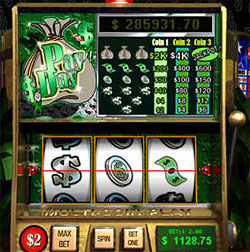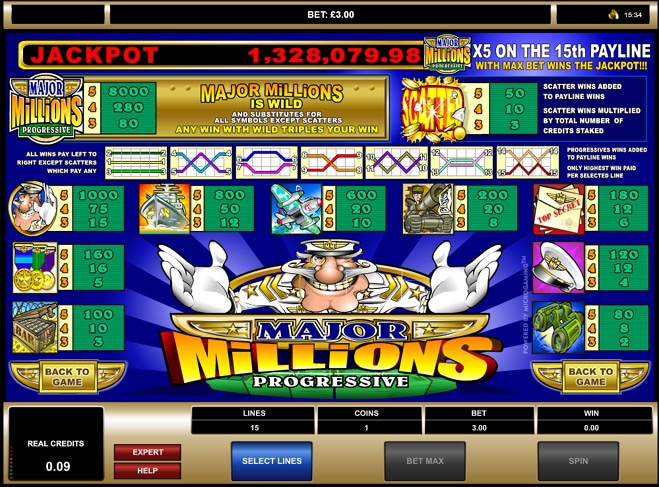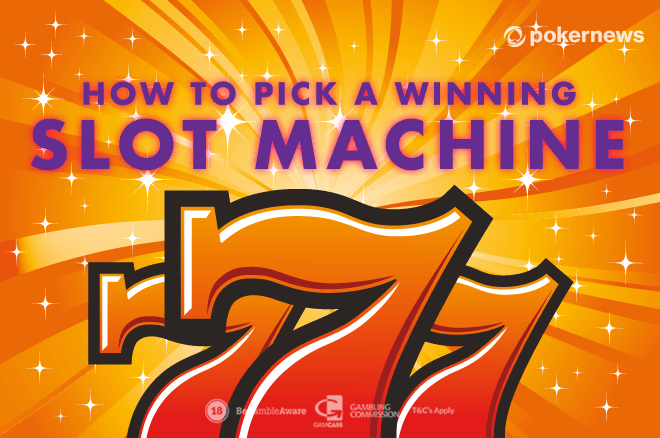MAXIMIZING SLOT PAYOUTS. Slot machines are not games of strategy. Live casinos and online casinos offer them as games of pure chance. Only rarely does skill come into play, although skill-based slots loom as a coming attraction.On most slot games, there’s nothing you can do to change the outcome. What does a slot machine's Payout Percentage actually mean? Claim a Bonus Today! If you are a keen slots player then you will know that one of the most useful pieces of information about a slot that you can discover is the payout percentage for the game. Return to Player (RTP) is the factor that decides how much the slot pays out. If the slot has an RTP of 96%, then for every $100 that is gambled, the slot will payout out $96. This is regulated and independently tested to make sure you have a safe environment to play it.
A slot machine will often have three or more reels or a video screen, which is spun when either the slot lever is pulled or a button is pushed.
How much does a slot machine cost?
On average, plan on spending anywhere from $200 for a novelty slot machine to as much as $3,000 for a higher-end model of a working slot machine, similar to the ones you see in a professional casino. This would be the price for those who are interested in buying a second-hand slot machine for their own entertainment purposes at home.
However, if you’re talking about what a casino pays for a slot machine, the costs could be much more. Experts have noted official casino slot machines can cost as much as $20,000. For instance, this article claims that Bally sells its machines for $9,671 each. The costs, in the end, will come down to the manufacturer, the quality of the hardware, the intellectual property it represents and title. Calvinayre.com, on the other hand, says the average IGT game sold for $13,000 in 2013, while another manufacturer, Multimedia Games, received over $18,000, on average, from its machines.
Gambler’s Paradise, a slot machine retailer located in Ohio, lists close to 50 slot machines, ranging from $600 to $3,000+
Refer to our table below to see what you may pay for a slot machine in working order on the second-hand market:
| Type of Slot Machine | Average Price |
|---|---|
| Antique/Vintage Slot Machine | $1,000 to $3,000 |
| Bally Slot Machines | $125 to $800 |
| IGT Game King | $1,200 to $2,500 |
| IGT Slot Machines | $400 to $700 |
| Jennings Slot Machines | $1,600 to $3,200 |
| Video Slot Machines | $400 to $1,600+ |
| Williams Slot Machines | $650 to $2,000+ |
Slot machine overview
Generally, there are two common types of slot machines: a mechanical and computerized. When slot machines first hit the market, all were mechanical, operating gears and levels. Eventually, as the time when on, these gears were replaced with an electric slot machine which used motors and solenoids to run the gears. Today, most slot machines will use a computer to general a random number to generate the slot machine’s outcome.
Retailers often include a limited warranty, which often lasts up to a year,
What are the extra costs?
Repairs, depending on how much the slot machine is going to be used, needs to be factored in. Some machines can be more difficult to repair, whereas some machines will rely on a battery, which, over time, will need to be replaced as well. Even if the machine isn’t used for a long period of time, the battery may need to be replaced.
A common problem for slot machine owners, according to this eBay guide, is a lost door key. If this were to happen, you will either need to hire a locksmith, purchase a new one for $20 or so or learn how to drill and barrel the locks.
Due to the size of a slot machine, freight shipping charges may apply.
Tips to know
There are legal implications if you’re thinking about buying a slot machine. In 41 states, it is legal to own a used slot machine, but in nine states: Alabama, Connecticut, Hawaii, Indiana, Nebraska, New Mexico, South Carolina, Tennesse and Wisconsin, it is 100 percent illegal. In 17 states, there will be a law that the slot machine must be, at a minimum, 25 years old. With all of that being said, check your state laws to make sure it’s legal to own.
How can I save money?

If you do not mind buying used, this can save you upwards of at least 50 percent. Try to explore the used inventory before buying new.
Advertising Disclosure: This content may include referral links. Please read our disclosure policy for more info.
Average Reported Cost: $0
How much did you spend?
Introduction to Taxable Jackpots
One of the most popular slot machine questions on Google searches is: How do slot machines pay out taxable jackpots? I’ve assumed this question is about the mechanics of the payout process. A different upcoming post deals with explaining when slot machines pay out.
Slot machines are special-purpose computers, like a lot of equipment found in our lives. Specifically, standard tools are televisions, electronic watches, gas station pumps, cash registers, bank ATMs, automobiles, baby monitors, and the list goes on and on.
Each of these devices has one or more computer microprocessors, visual display, audio speaker, and some may also have a way to accept and/or dispense money either physically or virtually online.
Beyond controlling the multiple interfaces to and from the player, the computer within a slot machine also manages the odds of a player winning.
At its core, a pseudo-random number generator (PRNG) is a calculation. This PRNG is an element of the computer programming algorithm used by slot machines.
PRNGs (or more commonly RNGs) determine the outcome of a player’s bet based on the pre-determined odds of winning as set by the casino operator within the limited options provided by the slot machine manufacturer.
As previously mentioned elsewhere, winning a jackpot involves using the PRNG twice:
- To determine if a jackpot is won
- To determine how much was won
Keep Reading … or Listen Instead!
Subscribe to the Professor Slots podcast at Apple Podcasts | Google Podcasts | iHeart Radio | Spotify | Stitcher | Pandora | Tune-In | SoundCloud | RadioPublic | Android | RSS and wherever else you find podcasts!
The Slot Machine Gambling Process
Once a player selects a specific slot machine, that machine operates to accept or reject the inserted cash, ticket voucher, and reward card.

Next, it accepts the player’s selection for denomination amount and amount of credits to be bet, although it will merely reject one or both settings if insufficient funds are available to make such a bet.
When the bet is placed, the machine immediately selects the latest random number generated by its RNG to determine the outcome of the bet and well as updating the players club card with the points earned for placing the bet.
At the end of this process, the machine turns the reels to show the outcome of the bet. See below for this player-machine sequence of events.
During slot machine gambling, a sequence of actions and reactions take place between the player and machine. The player:
- selects a specific machine, inserts money in the form of cash or ticket voucher
- chooses from the denominations available
- chooses the number of credits to bet
- places a bet
- observes the results of the bet including any bonus round
- receives winnings from the bet (if any)
- then, either:
- leaves the machine empty handed
- cashes out any remaining funds and leaves with a ticket voucher
- continues playing the machine.
The player may choose to insert a player card at any time before or during play, then later remove it before leaving the machine.
Jackpot!
Between determining the outcome of the bet and turning the reels, the machine executes programming code that sets the reels.
The reels turn in a way the machine’s game designers consider most entertaining to the player – such as stopping on reel symbols for non-wins which are next to the symbols for sizable jackpots.
As mentioned, the bet’s outcome is determined when the bet is placed, not when the reels stop moving, despite the entertainment value derived by the player when observing the “action” of the slot machine.
How Often Do Slot Machines Payout

In the event of a win, the machine executes further programming to activate sequences of lights and sounds while updating the information display for the player, which is referred to as a roll-up.
Now What? – The Jackpot Pay Out Process
If a jackpot less than the taxable limit is won, slot players can simply proceed with continuing to play or cash out from that slot machine. The current taxable jackpot limit is $1,200 in the United States.
Meaning, if you have a win of $1,200.00 or more at a slot machine, there is an immediate tax bill resulting in an IRS Form W-2G. If you have a win of $1,199.99 or less, there is no immediate tax bill.
Jackpots that require immediate payment of taxes results in the slot machine locking up.
Many, many slot players have been surprised by their slot machine locking up when a taxable jackpot is won. It can only be unlocked by a casino employee, a slot attendant.
Whether a casino is old or new, a slot attendant will arrive shortly to administer a hand payout. During a hand payout, a slot attendant
- collects personal identification sufficient to both complete a tax form as well as any other state-required documentation
- performs the hand payout (if they have adequate cash on hand)
- unlocks the machine to allow the player to continue.
If the attendant is not carrying enough cash with them, or if the player wishes to have a cashier’s check instead of a cash payout, the slot attendant leaves the player with a receipt and returns a short while later with the check or cash.
If the attendant leaves, they typically unlock the slot machine beforehand to allow the player to continue betting while waiting for the slot attendant to return.
Summary of Taxable Jackpots
The most important thing to remember about winning a jackpot is to make sure you’ve brought your government-issued I.D. If you don’t have it, then you cannot receive a taxable jackpot.
And, no, your friend sitting next to you cannot claim the jackpot for you – the eye in the sky knows it’s your winnings and not someone else.
The second thing to be aware of is what is or is not a taxable jackpot, a single win of $1,200 or higher. Many people have never won a taxable jackpot, so it can be challenging to get useful information on this unless you’ve done it more than a few times. But I have.
If the machine locks up, it’s either had an error or you’ve won a taxable jackpot. Being out of paper is a machine error, for example. Either way, a slot attendant will show up shortly to help. For goodness sake, don’t walk away until you know which!
As a final note, as of this writing, a decade ago, casinos moved away from using coins. Nowadays, they use cash, checks, and vouchers redeemable at cash machines and cages.
Related Articles from Professor Slots
Other Articles from Professor Slots
- Previous: Why Do Slot Machines Use Fruit Reel Symbols?
- Next: Who Builds Slot Machines Throughout the World?
What Is A Slot Machine Payout
Have fun, be safe, and make good choices!
By Jon H. Friedl, Jr. Ph.D., President
Jon Friedl, LLC